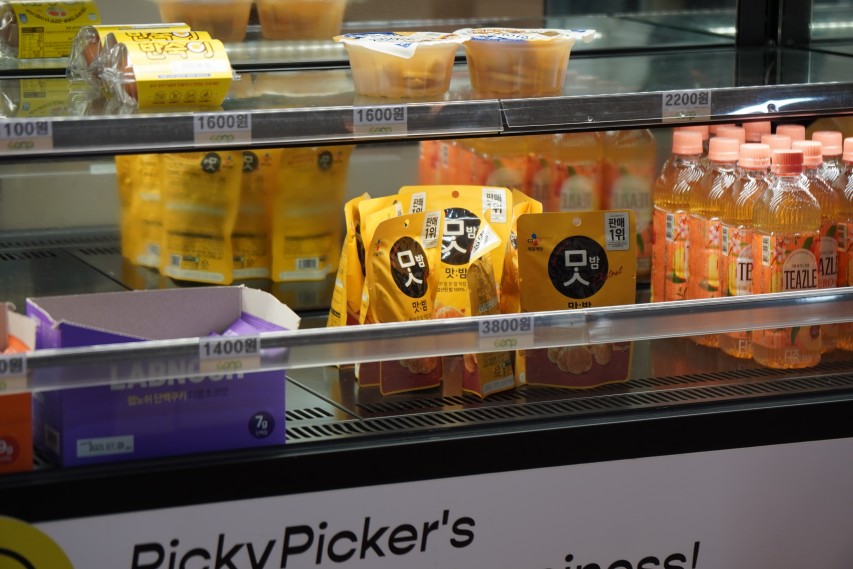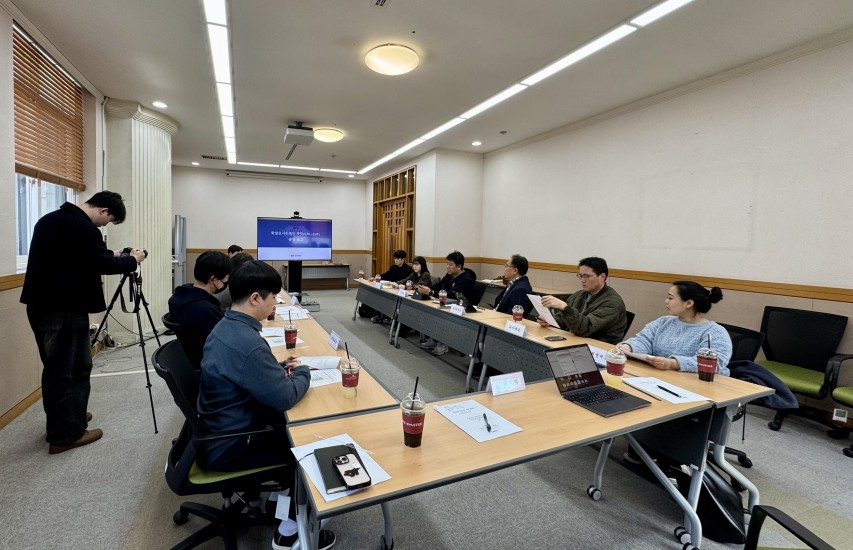[Campus] KHU Cooperatives Opens Its Doors — How Did the KHU Community Respond?
The first Student Center Cafeteria Management Committee of this year was held at Global Campus Central Library on March 28 at 03:00 p.m., joined by the new cafeteria meal provider, Kyung Hee University (KHU) Cooperatives. This meeting brought together various representatives from the KHU Global Campus, including the General Affairs Team (GAT); representatives of faculty, graduate school, and KHU staff; KHU Cooperatives staff; and members of the Global Campus General Student Association (GSA) Core. As a kick-off meeting, participants primarily exchanged information regarding the long-term operation strategies.

New Pop-up Deli operating by the KHU Cooperatives
GAT’s Committee Operating Plan
As this was the committee’s first meeting of the year, it began with an introduction of its purpose and structure. The GAT explained that the committee consists of nine representatives from various KHU stakeholder groups and emphasized that it limits its focus to issues related to the Student Center cafeteria. “The 2nd Dormitory’s cafeteria is managed by a different contract, so this committee does not address matters concerning that facility,” said GAT.
The prominent feature of the meeting was the participation of the new cafeteria meal provider. The management group for the cafeteria was transferred from Riaeni La Matinee, the previous meal provider, to KHU Cooperatives since February this year. After a trial operation beginning on February 17, the cooperatives officially took over cafeteria operations at the start of the semester. Thus, this meeting marked the first official discussion regarding their management.
Another new addition to the committee was KHU-EAT, the renamed student cafeteria monitoring team under the GSA. While the team’s name changed, their role remains the same as last year—conducting both scheduled and unscheduled inspections of the cafeterias at the Student Center and the 2nd Dormitory.

The Student Center Cafeteria Management Committee is conducting the meeting
A Smooth Beginning for KHU Cooperatives
Following the introduction, KHU Cooperatives presented an overview of their operating status so far. Kim Min-hwa, Secretary General of KHU Cooperatives, stated, “We receive approximately 18 million won in revenue on weekdays and 16 million won on Fridays, and have accumulated 76 million won for total revenue as of yesterday.” He added that this figure surpasses that of the Pureunsol student cafeteria and is comparable to the Cheongwoon student cafeteria.
Kim was also optimistic about future revenue. He explained that although the cafeteria is currently operating at a loss, mainly due to a 62 million won investment in new meal plates, Profit is expected in the long term if the current pace of visitors.
GAT viewed the current profit trend positively as well. “The cafeteria’s break-even point is 17 million won, so earning 18 million won indicates strong performance.” They added, “We hope KHU cooperatives will establish a sound financial management framework to ensure continued positive results.”
Regarding the other committee members, all of them were satisfied with the cooperatives’ operation. A faculty representative added, “I noted that the plates have been placed upside down, which shows their close consideration to hygiene.”
Discussing Current Primary Issues
“The first meeting with Riaeni La Matinee was friendly,” the faculty representatives remarked during the meeting. However, this suggests that although the initial atmosphere was positive, it did not lead to lasting satisfaction—Riaeni La Matinee was repeatedly criticized throughout the meeting.
Alongside the compliments from participants, several other issues were also discussed. The primary issue acknowledged by most members was the long lines during meal time. In addition, GAT expressed concerns about the servicing timing of Western meal offerings, the need to expand dinner service locations, and the potential for increasing the number of kiosks.
Kim noted that a shortage of staff is contributing to long lines and the limited availability of Western meals. “If we had more staff, we could manage the lines better and offer more Western meals,” he said. He added that 14 workers were hired based on information provided by Riaeni La Matinee and deficit concerns raised by GAT. However, it has become clear that additional workers are needed, and he stated that they will bring more staff to address the issue.
The dinner service may be adjusted depending on the menu. Kim explained, “If the menu requires serving food in bowls, it is difficult to offer meals at multiple stations due to the bowl quantity limitation. However, when the menu does not require bowls, we can expand the number of serving stations.” He added that they will indicate this difference on the menu.
There was a difference of opinion between GAT and the cooperatives regarding the use of kiosks. Currently, users must purchase meal tickets to dine at the cafeteria, either through a mobile ticket application (app) or a physical ticket from a kiosk. GAT mentioned that two kiosks are placed at the faculty cafeteria and four are at the student cafeteria. However, 30% of all faculty customers and 70% of students rely on the kiosks rather than the ticket app, which raises the question of whether more kiosks should be installed to accommodate the demand for physical ticketing.
Kim held a different view, “We are encouraging users to use the app rather than kiosks. As for GAT’s suggestion that this is because of kiosk rental fees, that is not accurate. We also incur certain costs to operate the mobile ticket system.”
Unlike the committee members, KHU cooperatives voiced a different concern. Kim remarked, “More users than we expected are visiting the cafeteria, but the ingredient storage space is quite limited. We are currently looking for a company to help address this issue, and we expect it to be resolved soon.”
The Long-term Strategy for the Future
At the end of the meeting, GAT shared several considerations for future operations. They explained that the cafeteria is still in the process of aligning its menu with the Seoul Campus. Once operations have stabilized, they hope KHU Cooperatives will be able to develop a menu tailored specifically to the Global Campus.
Additionally, GAT pointed out that summer will be a critical period for hygiene, stating, “As the weather gets hotter, bugs are more likely to appear in cooking areas. KHU cooperatives should pay extra attention during the summer to prevent issues like the ones caused by Riaeni La Matinee.”
The initial operation of KHU Cooperatives has been relatively stable, especially in comparison to Riaeni La Matinee. However, since the operation is still in its early stages, unexpected challenges may arise in the future. Therefore, continued management efforts and close attention to the cafeteria seem essential to improving the dining experience for the KHU community.
There are no registered comments.
- 1
- 2
- 3
- 4
I agree to the collection of personal information.

